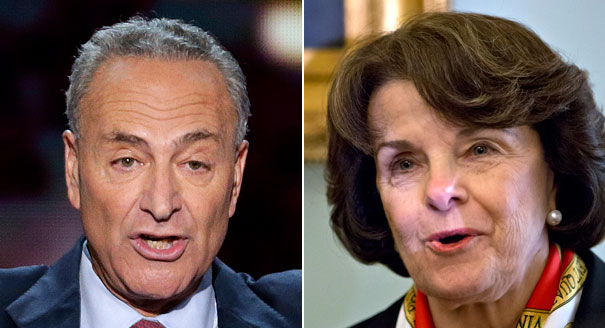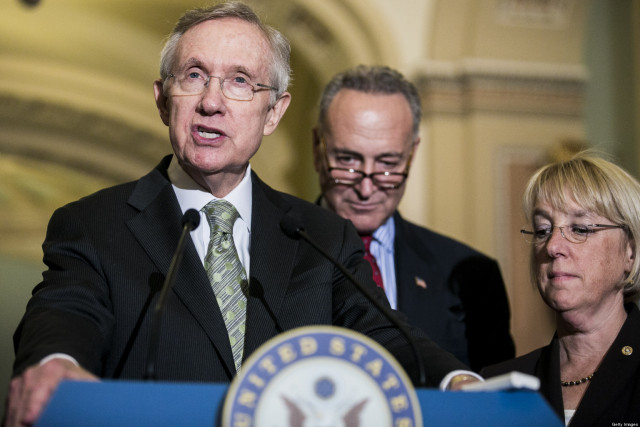Benghazi and Iran: The Two Faces of Sen. Dianne Feinstein
Senator Dianne Feinstein (D-CA) is much in the news as head of the Senate Intelligence Committee given the release Wednesday of the long-awaited bi-partisan Benghazi Report. Contrast that with her withering criticism of the nearly veto-proof new Iran Sanctions legislation. On Tuesday she rose on the floor of the US Senate to give a ringing condemnation of the bipartisan Nuclear Weapons Free Iran Act (S. 1881), seeking standby sanctions authorities, as unnecessary and dangerous legislation acceding to saber rattling by our ally Israel. She castigated it for disrupting the Administration’s diplomatic initiative with Iran with what she deems a ‘strong’ P5+1 agreement triggered by concerns over Israel’s security. She observed:
And let me acknowledge Israel’s real well founded concerns, that a nuclear-armed Iran would threaten its very existence. I don’t disagree with that. I agree with it, but we’re not there yet. While I recognize and share Israel’s concern, we cannot let Israel determine when and where the United States goes to war. By stating that the United States should provide military support to Israel in a former resolution should it attack Iran, I fear that is how this bill is going to be interpreted.
The Republican Jewish Coalition (RJC) in a release yesterday, upbraided Sen. Feinstein for these remarks. Matt Brooks, RJC executive director said:
Senator Feinstein is within her rights to disagree with a bipartisan majority of her colleagues who support Kirk-Menendez, but her suggestion that those colleagues have ceded control over ‘when and where the United States goes to war’ to Israel is outrageous, inflammatory and completely baseless.
[…]
We are deeply troubled to see Senator Feinstein making such incendiary and inaccurate remarks on the Senate floor. We call on her to retract this reckless and false charge and apologize to her colleagues and to the millions of Americans who support a comprehensive, robust strategy to prevent the Tehran regime from obtaining nuclear weapons capability.”
Watch Sen. Feinstein’s Senate floor speech on this C-SPAN video clip.
Contrast Sen. Feinstein’s Senate Floor remarks on NWFIA with the news that followed the release of yesterday’s Benghazi Report by the Senate Intelligence Committee.
The Benghazi Report, according to The Wall Street Journal in a lead article in today’s edition, “Benghazi Report Spreads Blame”, lambasted both the State Department and the Intelligence community. It indicated that this was a “preventable attack” that took the lives of four Americans including the late Ambassador to Libya Christopher Stephens. These valiant Americans may have died because of the lack of State Department attention to requests for enhanced security that might have been provided prior to the September 11, 2012 attack. That could spell trouble for former Secretary of State Clinton poised many believe to seek her party’s nomination for the Presidency in 2016. Senator Feinstein in remarks captured in a Global Affairs blog article of The Hill, “Feinstein rejects NYT on Benghazi,” lent the impression that the attack may have been perpetrated by a local terrorist group, Anshar al-Sharia ‘influenced’ by Al Qaeda. The Global Affairs blog noted both her comments:
The chairwoman of the Senate Intelligence Committee said that key conclusions of a recent New York Times investigation into the 2012 Benghazi attack are wrong.
Sen. Dianne Feinstein (D-Calif.) rejected the Times’s conclusion that al Qaeda wasn’t responsible for the attack that killed Ambassador Christopher Stevens and three other Americans. She also took issue with the notion that the Libya strike was sparked by a U.S.-made anti-Islam video online.
“I believe that groups loosely associated with al Qaeda were” involved in the attack, she told The Hill last week. “That’s my understanding.”
She also disputed the notion that the Sept. 11, 2012, assault evolved from a protest against the video, which was widely disseminated by Islamic clerics shortly before the attack.
Given her Senate floor speech on NWFIA and Israel, Sen. Feinstein might address the objections of RJC executive director Brooks by heeding the comments made during the January 14th Endowment for Middle East Truth (EMET) conference call – listen to this excerpt on You Tube – by both former Israeli Amb. (ret.) Yoram Ettinger, Dr. Michael Ledeen of the Foundation for Defense of Democracies and Sarah Stern, EMET’s executive director.
Commenting that Iran’s nuclear threat is directed at the US, Amb. Ettinger said:
I think that when it comes to Iran the top priority is to send a message to legislators, you don’t do that for Israel. You do it for America, namely Israel’s best friends on Capitol Hill are being told today by Israeli leaders and by friends of Israel, please have the back of our ally in the Middle East. It is the wrong approach. Israel should not be part of any Iranian related activity on the Hill. It is America which is the number one target for Iran and not Israel. Once American legislators realize that we are going to see a sea change of attitudes on the Hill which could be the element stopping Iran from becoming a nuclear power.
Stern of EMET then drew attention to just such an initiative by her group:
We at EMET are working on a television campaign with exactly that message to go all over the United States without even mentioning Israel. Instead, we talk about the annual November 4th ‘Death to America Rallies’ when they burned the American flag, etc… Iran has actually said that by 2015 they will develop a Shahab missile to reach the Eastern seaboard of the continental United States.
In an Iconoclast post in late November 2013 on the cusp of the P5+1 agreement, we raised the issue of “Could Iranian missiles threaten Florida by 2015?” I was acutely aware of this danger as a young US Army intelligence officer who lived through the Cuban Missile Crisis of October 1962. Sen. Feinstein was a young adult when the Soviet-backed threat nearly brought catastrophe to this hemisphere, prevented only because we were militarily prepared to act. In our blog post we drew attention to that eerie precedent. We cited current comments from Mark Regev spokesperson for Israeli Prime Minister Netanyahu and a Clarion project briefing with IDF Brig. Gen. (ret.) Michael Herzog on the Iranian missile threat to the US. We also referred to international investigative reports that a company owned by Iran’s Revolutionary Guard Corps was allegedly building a possible missile base equipped with those Shahab missiles Stern referred to on the Paraguaná peninsula in Venezuela.
As head of the Senate Intelligence Committee, Sen. Feinstein may have also been briefed on the same information. For her to disregard this clear and present danger by Iran to the US and her constituents is myopic, misleading and dangerous. The stronger stand by sanctions authorization under S. 1881 with near veto-proof bi-partisan support buttresses the diplomatic initiative the Administration is seeking to achieve. Sen. Feinstein needs to correct her Senate speech mistakes and apologize to her fellow Senators, all Americans and to our ally Israel. We must be realistic about the “catastrophic apocalyptic” threat that Iran’s nuclear program poses to regional and world peace. The current generation of Americans doesn’t have to live through another nuclear crisis as many of us and Sen. Feinstein did 52 years ago.
EDITORS NOTE: This column originally appeared on The New English Review.


